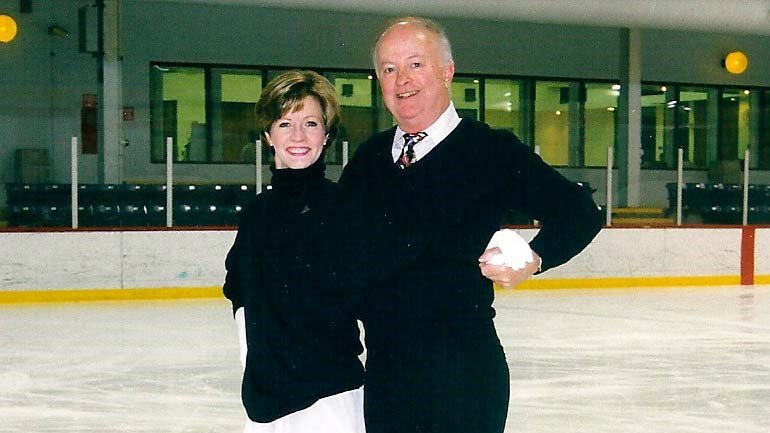Above: Bill Boeck and his skating partner Shelly Stein
By Abby Farrell
Around the time Bill Boeck began his judging career in 1963, Peggy Fleming was getting ready to win her first of five consecutive U.S. titles and Team USA was on the cusp of winning two bronze medals in figure skating at the 1964 Olympic Winter Games.
Sixty years later, Boeck is still involved in the sport as one of the longest-serving judges in U.S. Figure Skating history.
Boeck first started skating in St. Louis, Missouri in 1955 at the age of 14 after he and a group of friends went ice skating to celebrate passing their first roller skating test, and he caught the eye of a coach with the St. Louis Figure Skating Club. She asked if he would be interested in competing in a club competition at that same rink a few months later.
“[My father] always thought roller skating was very clunky and noisy, so he always wanted me to change to ice skating anyways, so I did,” Boeck said. “I went and bought some ice skates. As a matter of fact, I couldn't find any boy’s black skates, so I bought some girl’s white figure skates, and I took them home and roughed them up and dyed them black so I didn't have to wear white skates.”
Luckily, Boeck’s skills as a roller skater easily transferred to the ice, and he went on to compete in singles, pairs and ice dance, finding success in each discipline. His coach, Jack Jost, noticed his potential and convinced Boeck to spend his summers in Colorado Springs, Colorado to train with him at the Broadmoor World Arena (which was known as the Broadmoor Ice Palace at that time). Boeck traveled to Colorado Springs for the summer of 1956 and 1957, and then ended up living in Colorado Springs full-time to train. To pay for his skating lessons, Boeck worked as a busboy and waiter at the Broadmoor Hotel while he was finishing high school.
Despite quickly finding his groove within the sport, at the age of 16, Boeck sustained an unfortunate knee injury, effectively ending his competitive career, though he would still skate recreationally and stay active in the St. Louis Skating Club, holding every office, until fully retiring in 2005 at the age of 63.
As an adult skater, after moving back to St. Louis following his injury, Boeck was chairman of what was called the “Meet Me in St. Louie Ice Dance Weekend” at the St. Louis Figure Skating Club. These weekends were organized as an opportunity for ice dancers from all over the country to have uninterrupted ice time and socialize with their fellow ice dancers. In one weekend, participants would ice dance for up to eight hours.
“It was a very fun weekend,” Boeck said. “In fact, my oldest daughter was a skater and a dancer, and I would take her and we would go to these dance weekends to skate and dance with different partners. A lot of times there would be a nonqualifying competition incorporated into the weekend.”
In the same year that Boeck retired from competitive skating, he was approached by a fellow St. Louis Figure Skating Club member who asked if he had an interest in becoming a figure skating judge because of his background as an skater. He felt that it was an honor to be considered.
“I said to myself, ‘You know, what a great way to continue to be involved with the sport, and what a nice thing to be around the youngsters and to be a part of their pursuing of skating,’” Boeck said on his decision to start pursuing a judging career.
As of 2024, Boeck holds appointments as a gold figure, singles, pairs and dance test judge; and as a singles, pairs and ice dance qualifying competition judge. He is also certified to judge international pattern dance tests.
Over his 60 years of judging, Boeck has seen an incredible evolution in the sport. Currently, there is a larger focus on the artistic side of the sport, which Boeck appreciates.
“When [Nathan Chen] first came on the scene, his artistic ability was a little bit lacking, so he focused on his artistic side – interpreting music with his body and moving to the music,” Boeck said. “That's all improved, dramatic since he arrived on the scene, and that's what you now see in the way of the evolution of the sport. I like to see the artistic side, and many of us judges feel the same way.”
In 2013, Boeck was invited to U.S. Figure Skating’s Governing Council meeting in Colorado Springs, Colorado, to be honored his 50th year as a judge. In his remarks, he emphasized that “Not to be overlooked are the thousands of smiles that we receive from the skaters that have passed their tests or those that have won a place on the podium at a competition, for this provides a joy that is hard to match.”
Looking towards the future, he offered one piece of advice for the next generation of judges who are just starting their careers.
“Keep an open mind and always have the willingness to learn as you judge. I’ve been judging for 60 years, and I can say I've always learned something new if I judge either a test or competition. Humility is a good thing,” Boeck said.
Boeck, who is now 82 years old, now resides in Colorado full-time, and still judges tests and competitions to this day with no definitive plans to officially retire soon.


